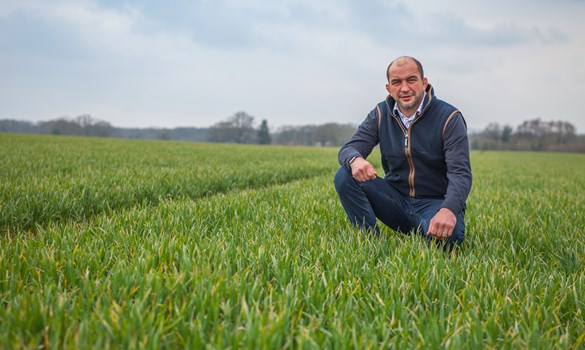Monitor Farm meeting: Petworth
How can Integrated Pest Management & Integrated Farm Management strategies make a viable difference?
With ever increasing pressures and legal regulations being placed upon the armoury within our chemical tool boxes and the farming economics, we will have to place more emphasis on Integrated Pest and Farm Management Strategies in order to help resolve these issues. Therefore, at this event you will get the chance to understand what these popular terminologies mean. Hear about current Integrated Pest Management research and the possible alternative pest control strategies that could increase the future viable protection of your crops.
Speakers
- Dr Sacha White specialises in developing integrated pest management programmes (IPM) for arable pests. A focus of his work at ADAS in recent years has been on cabbage stem flea beetle (CSFB), having led projects investigating control methods, larval population surveys for AHDB and monitoring the impact of the 2015 neonicotinoid derogation in winter oilseed rape. He is currently working an AHDB-funded three-year IPM project looking at improving control of CSFB, which includes investigations into crop tolerance, varietal resistance, agronomic risk factors, pest predictions methods and non-chemical control options for the pest. He has presented at numerous grower and agronomist events and scientific conferences, and contributed to several publications, including AHDB’s ‘Encyclopedia of pests and natural enemies in field crops’.
- Andy Barr who many will know through his regular farming up-dates in the Farmers Weekly, farms at East Lenham in Kent. He moved to a no-till strategy in 2010 introducing cover crops on the farm together with, integrating companion crops with wheat and oilseed rape. After stopping using foliar insecticides some 12 years or so ago, he has been trialling a decreased fungicide regime i.e. using resistant crop varieties, varietal mixes in wheat and oilseed rape, and experimenting with crop competition. He has been reintegrating livestock (sheep), bringing grass back into the rotation, rotational grazing cover crops, and cultivating herbal leys; increasing the diversity in the grass. His farming ethos is to reduce chemical inputs, through a systems approach; combining different feasible, practical techniques.
Progamme
- Registration
- Welcome and introduction: Paul Hill – AHDB Cereals & Oilseeds Knowledge Exchange Manager (South East)
- Petworth MF farming operational update: Mark Chandler
- Understanding the pests & options to help deal with them: Dr Sacha White
- Coffee/Group break-out session (Pest ID or, what IPM strategies are you currently using?)
- Feedback/discussion:
- understanding the pests & options to help deal with them- take home messages: Dr Sacha White
- IPM/IFM in practice – my experiences: Andrew Barr (farmer case study)
- Event summary: Paul Hill AHDB
- Lunch and finish
About Petworth Monitor Farm
Mark Chandler runs Moor Farm at Petworth in West Sussex in partnership with his father Richard, managing a total of 1,285ha including AHA tenancies, FBTs, contract farming agreements and stubble-to-stubble contracting. Mark grows spring malting barley, oilseed rape, spring beans and winter wheat on loam over weald clay soil with some sandy clay loam. The farm has been in non-inversion tillage for 20 years, and Mark continually works towards moving less soil. Mark wants to improve his current farm practices to increase his productivity.
Find out more by visiting the Petworth Monitor Farm page
About Monitor Farms
AHDB Monitor Farms bring together groups of like-minded farmers who wish to improve their businesses by sharing performance information and best practice around a nationwide network of host farms. AHDB organises and facilitates Monitor Farm meetings for farmers, who own and operate the scheme – by farmers, for farmers.
Monitor Farms are part of the AHDB Farm Excellence Programme. Each Monitor Farm project runs for three years.
Sectors:
If you have any questions about this event, please contact us using the details below.


